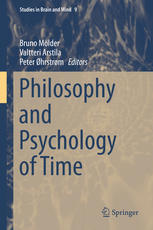

Most ebook files are in PDF format, so you can easily read them using various software such as Foxit Reader or directly on the Google Chrome browser.
Some ebook files are released by publishers in other formats such as .awz, .mobi, .epub, .fb2, etc. You may need to install specific software to read these formats on mobile/PC, such as Calibre.
Please read the tutorial at this link: https://ebookbell.com/faq
We offer FREE conversion to the popular formats you request; however, this may take some time. Therefore, right after payment, please email us, and we will try to provide the service as quickly as possible.
For some exceptional file formats or broken links (if any), please refrain from opening any disputes. Instead, email us first, and we will try to assist within a maximum of 6 hours.
EbookBell Team

4.4
42 reviewsThis book is an edited collection of papers from international experts in philosophy and psychology concerned with time. The collection aims to bridge the gap between these disciplines by focussing on five key themes and providing philosophical and psychological perspectives on each theme.
The first theme is the concept of time. The discussion ranges from the folk concept of time to the notion of time in logic, philosophy and psychology. The second theme concerns the notion of present in the philosophy of mind, metaphysics, and psychology. The third theme relates to continuity and flow of time in mind. One of the key questions in this section is how the apparent temporal continuity of conscious experience relates to the possibly discrete character of underlying neural processes. The fourth theme is the timing of experiences, with a focus on the perception of simultaneity and illusions of temporal order. Such effects are treated as test cases for hypotheses about the relationship between the subjective temporal order of experience and the objective order of neural events. The fifth and the final theme of the volume is time and intersubjectivity. This section examines the role of time in interpersonal coordination and in the development of social skills.
The collection will appeal to both psychologists and philosophers, but also to researchers from other disciplines who seek an accessible overview of the research on time in psychology and philosophy.